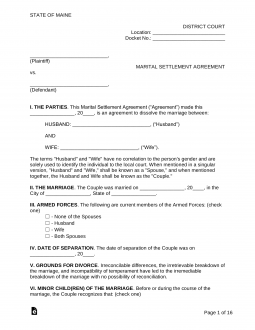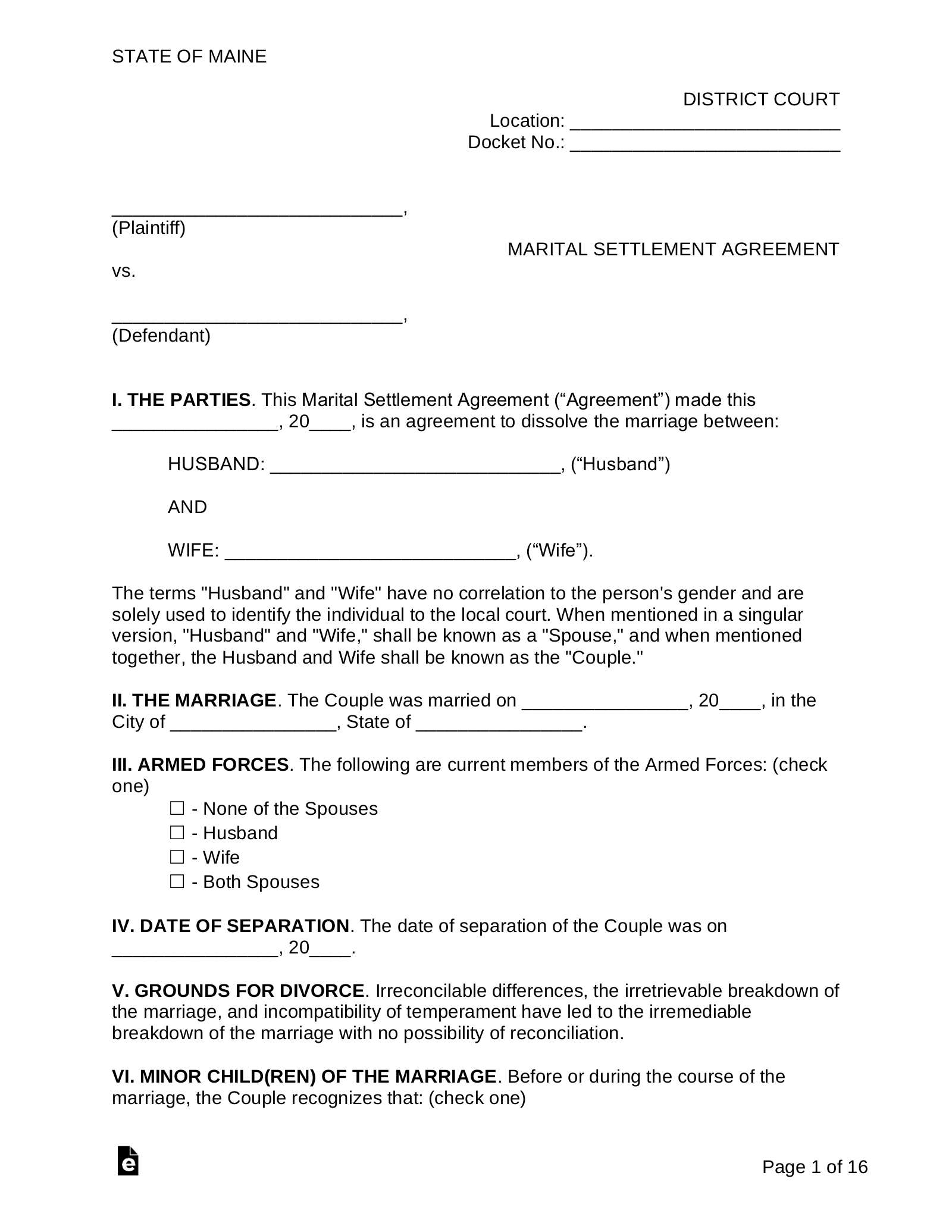Updated September 01, 2023
A Maine marital settlement agreement is a legally binding document, executed before or during court proceedings, that sets out the terms of a married couple’s divorce. By entering into a mutual agreement, the couple will be able to determine how their property will be divided and to whom child custody will be assigned. Other terms commonly covered in a marital settlement agreement include spousal support, insurance policies, child support, liabilities, and debts. If the couple doesn’t execute and file an agreement prior to their final divorce hearing, the court will divide their property and assets as they deem fair.
Table of Contents |
Divorce Laws
Statutes – Title 19-A, Chapter 29 (Divorce) and Chapter 63 (Child Support Guidelines)
Alimony (19-A §951-A(5)) – Either party may be awarded alimony (also called “spousal support”) to be paid to them in a lump sum or periodically over a limited term. The court will determine the payment schedule and amount in consideration of the following factors:
- Length of marriage
- Age
- Employment and income
- Education and training
- Retirement and health insurance benefits
- Tax consequences
- Health
- Contributions to the other party’s education/earning potential
- Economic misconduct resulting in the diminution of marital property
Under state law, support may not be awarded if the couple was married for less than ten (10) years, and the term of support cannot exceed half the length of the marriage for marriages of less than twenty (20) years.
- Alimony Calculator – calculators.law
Child Support (19-A §2006) – If the couple has children, one party will be required to pay child support to the other on a regular basis. The basic support obligation is based on the annual gross income of both parties and the number of children they have.
- Child Support Calculator – alllaw.com, FM-040 Child Support Worksheet
Division of Property (19-A §953) – Maine is an equitable distribution state, which means that the couple’s property is divided in a manner that the court determines to be fair (as opposed to equal). In reaching their decision, the court will examine and consider the property’s value, each spouse’s contribution to said property, their current economic circumstances, and who has the custody of the children (if applicable).
Grounds for Divorce (19-A §902(1), (2)) – To file for a no-fault divorce, one party must declare irreconcilable marital differences. If the other party denies this statement, the court may order them to undergo counseling before continuing the action. In a fault-based divorce, one party must be accused by the other of adultery, impotence, extreme cruelty, desertion for three (3) consecutive years, drug and alcohol addiction, non-support, or incapacity.
Interim Support (19-A §904(2) and 19-A §951-A(11)) – Upon receiving a motion, the court may award temporary financial support to one party during the course of a divorce action.
Residency (19-A §901(1)) – One or both spouses must have lived in Maine for six (6) consecutive months prior to filing, be a state resident, and/or married each other in the state to obtain a divorce.
Divorce Forms
- Where to File – District Court in County of Residence
- Filing Fee – $120
- How Long Does it Take? At least sixty (60) days
Uncontested Divorce with No Children:
- FM-080 – Divorce Cases: What to do with these Court Forms
- FM-004 – Divorce Complaint without Children
- FM-052 – Federal Affidavit
- FM-042 – Certificate in Lieu of Financial Statement
- FM-043 – Financial Statement
- FM-056 – Certificate Regarding Real Estate
- FM-186 – Answer and Counterclaim for Divorce
- CV-CR-FM-PC-200 – SSN Disclosure Form
- FM-002 – FM Summary Sheet
- FM-038 – Family Matter Summons and Preliminary Injunction (must be obtained from District Court for a fee)
- CV-036 – Acknowledgement of Service – Summons & Complaint or Post-Judgment Motion
- CV-FM-103 – Notice of Hearing
- Scheduling Order
- Divorce Decree
Uncontested Divorce With Children:
- FM-080 – Divorce Cases: What to do with these Court Forms
- FM-082 – Parentage, Parental Rights and Responsibilities Case: What to do with these Court Forms
- FM-004 – Divorce Complaint with Children
- FM-050 – Child Support Affidavit
- FM-052 – Federal Affidavit
- FM-040 Child Support Worksheet
- FM-042 – Certificate in Lieu of Financial Statement
- FM-043 – Financial Statement
- FM-087 – Info Regarding Case Management
- FM-186 – Answer and Counterclaim for Divorce
- FM-082 – Parentage, Parental Rights and Responsibilities Case: What to do with these Court Forms
- FM-006 – Parentage, Paternity, Parental Rights & Responsibilities, Child Support
- CV-FM-JV-PC-024 – Guardian ad Litem Voucher
- FM-187 – Answer and Counterclaim Parental Rights & Responsibilities
- CV-CR-FM-PC-200 – SSN Disclosure Form
- FM-002 – FM Summary Sheet
- FM-038 – Family Matter Summons and Preliminary Injunction (must be obtained from District Court for a fee)
- CV-036 – Acknowledgement of Service – Summons & Complaint or Post-Judgment Motion
- CV-FM-103 – Notice of Hearing
- Scheduling Order
- Divorce Decree
How to File for Divorce in Maine (8 steps)
- Fulfill the State Requirements for Divorce
- Complete Divorce Papers
- Serve Spouse
- File Divorce Papers
- Scheduling Order
- Marital Settlement Agreement
- Notice of Hearing and Case Management Conference
- Final Hearing and Divorce Decree
1. Fulfill the State Requirements for Divorce

Before filing for divorce, the couple must ensure that they meet the state residency requirements.
- Plaintiff lived in Maine for at least (6) months before filing
- Plaintiff is a Maine resident and the couple was married in Maine
- Plaintiff is a Maine resident and the couple lived in Maine when the cause of divorce occurred
- Plaintiff’s spouse is a Maine resident
2. Complete Divorce Papers
One party must complete the following forms prior to filing their case:
- Divorce Complaint
- Family Matter Summons and Preliminary Injunction (must be obtained from their District Court for a fee)
- SSN Disclosure Form
- Family and Probate Matter Summary Sheet
- Child Support Affidavit
- Financial Statement (or Certificate in Lieu of Financial Statement if there is an agreement)
3. Serve Spouse
After filling out the required forms, the individual who will be filing the action (the plaintiff) will need to serve their spouse (the defendant) copies of the Divorce Complaint and Summons and Preliminary Injunction to begin the divorce process. If both parties are in agreement regarding the dissolution of their marriage, the plaintiff can personally deliver the documents along with two (2) copies of the Acknowledgement of Service form and a self-addressed envelope. By filling out the acknowledgment and returning it to the plaintiff, the defendant attests that they do not wish to file an answer to their spouse’s complaint. If they wish to contest the case, an Answer and Counterclaim for Divorce.
If the plaintiff chooses not to serve the complaint and summons personally, it must instead be sent by the sheriff’s office (a fee will be charged). After being served, the defendant will need to complete and return the Acknowledgment of Service.
4. File Divorce Papers
Once the defendant has been served and they’ve issued their response, the plaintiff will need to file all of their completed divorce papers and proof of service with the clerk of the District Court in which they or their spouse is a resident. Unless the plaintiff obtains and submits a fee waiver form, the clerk will charge them a fee of $120 for the case filing.
If the defendant seeks child support and/or alimony, they will need to fill out the Child Support Affidavit and Financial Statement and file them with the court.
5. Scheduling Order
After all of the required documents (including the defendant’s acknowledgment or answer) have been filed with the court clerk, the clerk will issue a Scheduling Order to both parties. This document will inform the divorcing couple of all the requirements and deadlines for their case. If the couple is in agreement and the defendant didn’t file an answer, the court will schedule an uncontested hearing.
6. Marital Settlement Agreement

Prior to an uncontested hearing, the couple will need to draft and execute a Marital Settlement Agreement to set out the terms of their divorce and file it with the court. Otherwise, their property and determine child custody will be divided by the court.
7. Notice of Hearing and Case Management Conference
When a date and time have been set for the case’s hearing, both parties will be sent a Notice of Hearing that informs them they must appear if they wish to be heard. If the couple has children, they will be required to attend a case management conference to determine how much time will be allotted for their case. If the couple has reached an agreement, they can complete and file the Certificate in Lieu of Case Management Conference to waive the conference requirement.
8. Final Hearing and Divorce Decree

At the scheduled hearing, both parties must arrive on time and be prepared to answer questions regarding the particulars of their case. The judge will make a ruling on the divorce after the hearing has taken place and execute a Divorce Decree making the divorce final. Both spouses will need to obtain certified copies of the decree from the court clerk (a fee may be charged). In accordance with §1051, the court may approve a legal name change for either spouse in conjunction with their divorce decree. Otherwise, a Petition for Name Change must be filed following the divorce.


